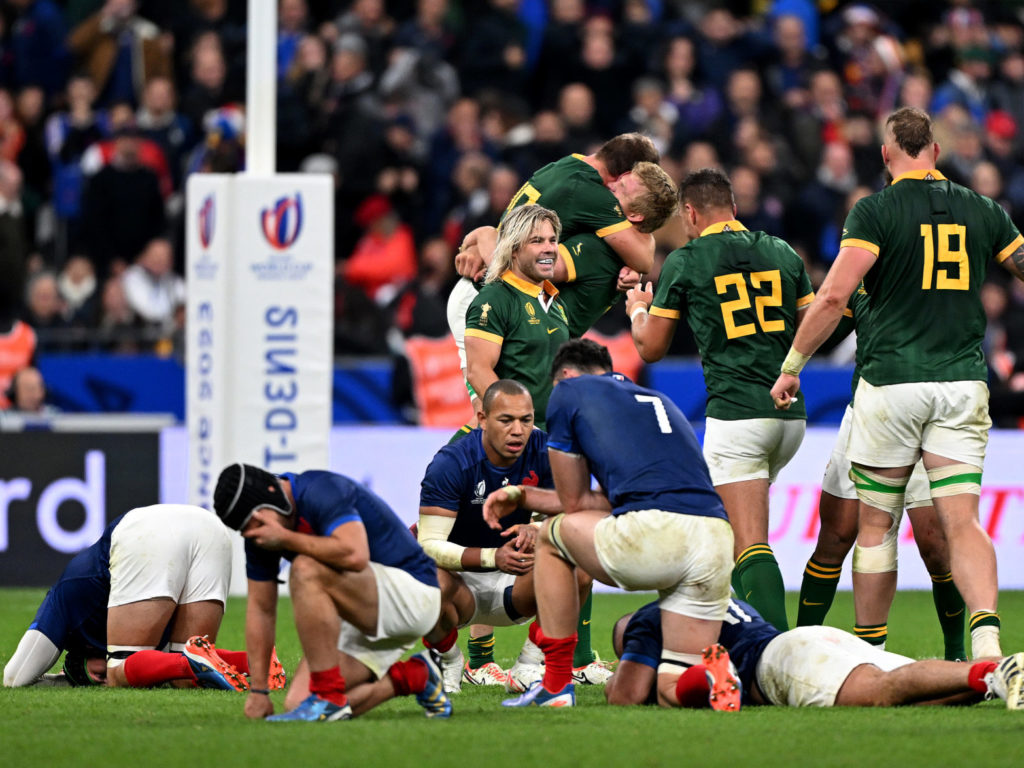The Springboks’ performance in Paris is more than a collection of successful tactical actions, it’s who they are. And they are favourites to win the World Cup because of this, writes RYAN VREDE.
Throughout the World Cup, the Boks have been characterised in myriad ways – defensively and offensively brutal, and tactically pragmatic among those. These are actions they execute in search of victory. Yet through 80 minutes of the most captivating rugby of the tournament, what they did bowed to who they are.
The Boks played 63% of the match in their territory. They had just 40% possession. They were forced to make 66 more tackles and missed 31 more than France. France carried the ball for 100m more through the Test. They more than doubled the Boks’ gainline efficiency. They beat 31 more defenders. They won double the number of rucks.
I’d argue that any other team in the world succumbs to France’s unrelenting pressure and utter statistical dominance. In particular, the hosts tortured the Boks for a 20-minute spell (minutes 40 – 60) but could not strike a fatal blow. The defending champions scrambled in ways that can’t be coached. You have to want to haul your body off the grass. You have to want to make another tackle. You have to want to contest another ruck.
At this point, your actions speak to who you are as a man, not an athlete.
Having repelled the hope of a nation, the Boks took control of their opponent and waded out into deep water in a period that defined the Test. There, France’s considerable talent mattered less than their temperament.
It became increasingly apparent that they were in an unfamiliar and uncomfortable place. Conversely, the Boks’ belief grew. They’d inhabited this place before – in the last World Cup and in rebounding from a first Test defeat in the 2021 British and Irish Lions series. Their reward was familiarity with the fire. France was consumed by it.
In the wake of their exit, France lamented perceived refereeing flaws. This insults an opponent who was simply better than them when it mattered most.
It would be remiss to diminish the importance of technical, tactical, and physical dimensions of what the Boks did in Paris. But it was the intangible that allowed them to repress, then beat, a wonderful opponent. And it is the intangible that now makes them the tournament’s favourites.
Resilience is part of the fabric of their identity. It is not a one-off performance conjured from an indeterminate place. It is as replicable as any tactical element of their gameplan. They kick. They scrum. They tackle. They are resilient.
In this context, their power is rooted in the presence of the men who won the 2019 tournament. In hindsight, Rassie Erasmus, Jacques Nienaber, and the national selectors have amplified their chances of defending the title owing to that decision. It was evidenced in Paris on Sunday evening and will be the bedrock of their challenge against England in the semi-final on Saturday.
England should not be a match for these Boks. In their last two matches, they beat Samoa by a point, and Fiji by six. Those results are a true reflection of where that team is, not an aberration that will be course-corrected in the semi-finals.
It is true that the Boks could have an off day. And it is true that they could watch England contest a final against their great rivals, New Zealand, who are favourites to beat Argentina.
But it is hard to see this happening. The Boks will be tested on Saturday, certainly. They may need to scramble once more. But they have resilience in measures that England doesn’t. Indeed, in an overall analysis, there is no meaningful metric England is superior in.
It feels like a final meeting between rugby’s greatest rivals is inevitable. But that is for the future. Today we reflect on a Bok team forged in the fire.
LISTEN: World Champion Boks make a point
KEO: Battered, but not beaten, Boks subdue ferocious French
Photo: Mike Hewitt/Getty Images





